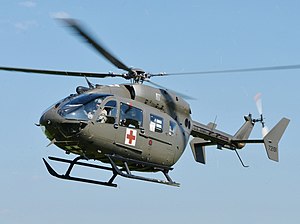| UH-72 Lakota | |
|---|---|
 A Nebraska Army National Guard Lakota, participating in exercise PATRIOT North 2016 | |
| General information | |
| Type | Light utility military helicopter |
| National origin | Multinational |
| Manufacturer | Eurocopter Airbus Helicopters |
| Built by | American Eurocopter Airbus Helicopters, Inc. |
| Status | In service |
| Primary users | United States Army |
| Number built | 463 (September 2020)[1] |
| History | |
| Manufactured | 2006–present |
| Introduction date | 2007 |
| First flight | 2006 |
| Developed from | Eurocopter EC145 |
The Eurocopter (now Airbus Helicopters) UH-72 Lakota is a twin-engine helicopter with a single, four-bladed main rotor. The UH-72 is a militarized version of the Eurocopter EC145, built by American Eurocopter (now Airbus Helicopters, Inc.), a division of Airbus Group, Inc. Several hundred UH-72 of various types have entered service by the 2020s since their introduction in 2006.
Initially marketed as the UH-145, the helicopter was selected as the winner of the United States Army's Light Utility Helicopter (LUH) program on 30 June 2006. In October 2006, American Eurocopter was awarded a production contract for 345 aircraft to replace the aging Bell UH-1H/V Iroquois and Bell OH-58A/C Kiowa helicopters in the US Army and Army National Guard fleets. The UH-72 performs non-combat logistics and support missions within the US for homeland security, disaster response missions, and medical evacuations. This allows the more expensive UH-60 and other types to be freed up for frontline service. The UH-72A is also used for helicopter pilot training.
In the 2020s the upgraded UH-72B version with various upgrades and a distinct ducted tail rotor began to enter service. The helicopter is noted for its lower procurement and operating costs, and deliveries are noted as being on-budget and on-time to the U.S. Army. The B model with 5-rotors (compared to 4) and other improvements was introduced in the 2020s and is the latest model entering service in 2021. Tests of an unmanned version were conducted. An armed scout version was entered in the U.S. Army's Armed Aerial Scout competition, though that program was cancelled in 2014 due to budget cuts. By 2022, over 460 aircraft had been produced including the A and B models.[2]
- ^ "En 2020, Airbus Helicopters s'en est bien sorti". Air et Cosmos. 27 January 2021.
- ^ "The Army Guard's New Workhorse: the Airbus UH-72B". Vertical Mag. Retrieved 7 May 2024.